The Enraged King Again Petitions the King for a Divorce
In late 2019, I wrote a detailed investigation into the flight of several women from the courtroom of Dubai's ruler, Sheikh Mohammed bin Rashid al Maktoum. The article was occasioned by the recent flight of his 6th and youngest married woman, Princess Haya, the daughter of the late King Hussein of Jordan and half-sister of King Abdullah, who escaped kickoff to Germany, and then London with their 2 children, now 9-year-onetime son, Zayed, and 13-year-old daughter, Al Jalila. And information technology was spurred, also, by 2 attempted escapes by the sheikh's daughter Latifa (from another marriage) and, on one still earlier occasion, of her older sister, Shamsa. Why were female members of the sheikh'south immediate family making runs for it?
My study into the scandals in the royal court of Dubai remains as relevant and troubling as always (it appears below). But there accept been fresh developments:
In March 2020 a British family courtroom judge a released a 34-page judgment in Haya's child-custody petition that laid bare the royal family'south dysfunction and her desperation: The findings revealed that Haya had conducted an affair with a male babysitter in 2017 or 2018 that enraged her husband and prompted him to begin making threats against her. On two occasions, Haya says she found a gun on her bed with its muzzle pointed toward the door and the safety lock off. She also received anonymous notes alarm her that "your life is over." That, together with the discoveries she'd made about the brutal treatment of Shamsa and Latifa after their own escape attempts, she revealed in court, prompted her to abscond. The sheikh denied all allegations, and Haya continued to live quietly in a London mansion with her son and girl.
Then, in late Dec 2021, the scandal leapt dorsum in the news. Sir Philip Drury Moor, a gauge of the High Court of England and Wales, ordered the sheikh to pay at least £540 million ($720 million) to his ex-married woman, in what the local press called the highest divorce settlement ever awarded past a British court. In the latest blow to Sheikh Mohammed, Guess Moor called the Dubai ruler the "main threat" to Haya and their children, citing a long campaign of "intimidation." About one third of the fiscal settlement would become toward maintaining round-the-clock protection for Haya for the rest of her life, and for her children until they finish academy. The justice cited the sheikh'due south abductions of his two delinquent daughters, his utilize of sophisticated spyware to track downwardly both Latifa and Haya, and an try by his agents to purchase a £30 million ($47 one thousand thousand) estate next door to Haya's country dwelling house nearly Windsor Castle—which he called "a very significant threat to her security." The risk to the estranged family, Moor said, was "clear and ever-present."
The barrage of revelations and court judgments has divided Emiratis. While the royal court has said piddling about the latest developments, "everybody has the Internet here," points out one expatriate businessman who has lived in Dubai for decades. He has many friends inside the Emirati royal clans, has easy access to every particular of the salacious example, and insists that he and others in his circle are treating the divorce judgment as routine. "In that location's zero shocking about it, these settlements happen. Look at Jeff Bezos. At the cease of the day, it'due south a personal issue," he says. (Bezos, in contrast to Sheikh Mohammed, paid out a mind-boggling $38 billion to his ex-married woman MacKenzie Scott in the largest divorce settlement in history; she turned over $four.2 billion to charity.) He also believes that it's the sheikh, not Haya, who deserves the majority of public sympathy. "He didn't put any restrictions on Haya," he says. "She had her own staff, she didn't have to cover up. He bent over backwards to accommodate her, and what did she practice? She had a ii-year matter, then she paid her bodyguards to keep quiet virtually it." (Haya, it was revealed in court, paid $9 one thousand thousand to her staff, including her ex-lover, to hibernate the matter.) But Radha Sterling, the director of Detained in Dubai, a London-based advocacy grouping that has fought for Latifa'due south freedom, says the judge's decision confirms a pattern of brutalization of women in the royal court. "Haya referred to Latifa's treatment in the proceedings to support her merits that her own children would not be safe if they visited Dubai or if the sheikh were granted custody," she says. "The judge accepted information technology."
Over the by yr, meanwhile, a trickle of information has provided some clues about Latifa'southward fate since she was forcibly dragged back to Dubai from a yacht heading toward Bharat. In February 2021, BBC Panorama released a video, recorded in April 2019 and apparently smuggled out of the palace, that seemed to ostend the fears of friends and other advocates: The princess claimed that she was being held prisoner within a locked villa, deprived of legal advice and medical treatment, and guarded by the police.
Only the story took a twist in spring 2021, when a photograph surfaced on social media showing the princess, now 35, seated at Dubai's luxurious Mall of the Emirates with two female acquaintances, and in credible good spirits. "Lovely evening at MoE with friends," read the explanation written by one of her companions. Kenneth Roth, the director of Human Rights Scout, welcomed the photo every bit "proof of life," but said that it showed nothing about "the atmospheric condition of her confinement or her freedom." I calendar month later, in June 2021, a British schoolteacher in Dubai, Sioned Taylor, posted an image of herself and the princess traveling through Madrid's international aerodrome. "Smashing European holiday with Latifa," Taylor wrote in the explanation. "We're having fun exploring!" Then, in August, some other photo appeared on Taylor's Instagram account showing Taylor, the princess, and her cousin on holiday in Iceland. That prompted the organizers of the Free Latifa advancement group, a rival to Sterling'south Detained in Dubai, to announce that the campaign was disbanding. "The primary purpose … was to encounter Latifa free and leading the life she chooses for herself," ran a statement concluding summer. "Nosotros have clearly gone a long way to achieving that goal over the last three years, with bodies such as the United Nations now monitoring the electric current and future wellbeing of Latifa."
Yet other developments drew farther attention to her father'due south attempts to keep her under his command. A collaborative investigation past 17 news organizations revealed that Dubai's government relied on phone hacking spyware known as Pegasus, provided past an Israeli security company, the NSO Grouping, to monitor Princess Latifa and Princess Haya as they both separately fled Dubai. (NSO terminated its contract with the United Arab Emirates when information technology found out about the spyware's "misuse.") Concluding summer a The states Today investigation revealed that the FBI had also helped Sheikh Mohammed locate his daughter at sea, providing him with tracking information following an urgent plea to rescue her from supposed kidnappers. (Neither the FBI nor the White House would comment on the bureau's role in the abduction.) In his only public statement about the incident, Sheikh Mohammed said he'd acted because "we feared that our daughter was in the easily of a criminal who might concur her to ransom and harm her. To this twenty-four hour period I consider that Latifa's return to Dubai was a rescue mission."
Opinion is as well divided on Latifa'due south treatment. The Dubai man of affairs says he and other supporters of Sheikh Mohammed view the princess as an emotionally frail immature adult female who was manipulated into rebellion by unsavory friends. "I'g not saying the detentions didn't happen," he insists, "but probably they were at that place to protect her." Only Sterling says that the evidence of abuse is undeniable, and disbelieves the claims that the princess has now been freed from her begetter's grip: "She has not been able to speak freely just has only been seen in staged photographs," Sterling maintains.
As for Sheikh Mohammed, the scandal appears to take permanently tarnished his image abroad. The Daily Mail reported this past October that Queen Elizabeth banished the Dubai ruler from the royal box at Ascot—a familiar perch for him for years. She "no longer wishes to rub shoulders with this controversial effigy," Sterling comments. "Sheikh Mohammed has a reputation for kidnapping and detaining his daughter, tormenting his wife… and committing espionage against foreign nationals."
My original full story is below.—J.H.
The Royal Courts of Justice, a massive Victorian Gothic construction on the Strand in the center of London built in the 1870s, is not typically the scene of media frenzy. But on the gray, dank morning of November 12, 2019, a cluster of photographers and reporters stood backside barricades, waiting for a glimpse of a reclusive celebrity. At 10:50 a.m. a black Range Rover pulled upwardly to the entrance. Flanked by two bodyguards and wearing a conservative dark light-green wearing apparel, Princess Haya Bint Hussein, daughter of the tardily Rex Hussein of Jordan and estranged married woman of Sheikh Mohammed Bin Rashid Al Maktoum, the ruler of Dubai, strode toward the entrance.
Right behind her came her barrister, Fiona Shackleton, who represented Prince Charles in his 1996 divorce from Princess Diana. The current divorce proceedings, betwixt ii of the earth'southward richest royals, were almost to enter a particularly acrimonious phase: a weeklong hearing over custody of the couple's children, an xi-year-sometime daughter and a seven-year-old son. Sheikh Mohammed had also armed himself with a top barrister, Helen Ward, who represented film manager Guy Ritchie in his divorce from Madonna.
Just, curiously, the sheikh—who had skipped preliminary hearings in July and October—had again decided not to announced. (According to the Daily Mail, Mohammed was in England at the time of the October hearing but chose to nourish the Tattersalls auction in Newmarket, Suffolk, where he laid downwards $4.8 million for a young equus caballus.) To observers, it was a startling decision by a man with so much to lose, and it was not likely to get over well with Estimate Andrew McFarlane, who had imposed a gag order on the proceedings.
The scene was a far cry from that of April 10, 2004, when Haya, 29, married Sheik Mohammed, 25 years her senior. She was elegantly clad in a white-and-gilt-embroidered wearing apparel and a sheer white veil, a simple emerald pendant around her neck; he wore a traditional Arab headdress known every bit a gutra and a long yellowish shirt.
The ceremony took place in a reception room at the Al Baraka Palace in Amman, every bit members of Jordan's ruling family, including Haya'southward one-half-brother King Abdullah, his married woman Queen Rania, and Princess Muna, the mother of the monarch and the former wife of the late King Hussein, looked on.
The wedding had the appearance of a strategic matrimony, yet by all accounts it was a match born of genuine feeling. The princess and the sheikh had fallen in honey, Haya would subsequently say, while participating in the World Equestrian Games at Jerez de la Frontera in Kingdom of spain two years earlier. "It was wonderful to understand someone without the demand for words," she told the Daily Mail in January 2009.
The Oxford-educated Haya had shrugged off the fact that she had become the sixth and about "inferior wife" of the sheikh, comparing the situation, somewhat misleadingly, to her father's having married Queen Alia, her mother, when he was not yet divorced from his previous married woman. "Falling in love tin can eclipse a lot of things," she said. "I went in [to this marriage] with my optics open up, and certainly I'm very happy."
The happiness of the royal couple over the next decade is on brandish in photographs taken of them, often hand in hand and with their children, at a multifariousness of glamorous events, from the Regal Ascot Races in England to the 75-mile Endurance Race at Wadi Rum, Jordan.
Haya lived with her children in her own lavish Dubai chemical compound—all the majestic wives have their ain households—but among the sheikh's consorts she alone reportedly had visitation rights to Zabeel Palace, his massive, walled-off mansion in the heart of Dubai, rather than having to wait on her husband to pay her a call, every bit is the custom.
It was a privilege she appears to take guarded jealously. "Princess Haya refused to share the [palace] residence with any of the other wives," a British source close to several of Mohammed's daughters tells me. She solitary amid his wives rode horses with him, attended public ceremonies beside him—e'er without a hijab—and traveled to international diplomatic events, meeting fellow royals effectually the world. "Every single day I give thanks god that I am lucky plenty to be close to him," Haya gushed to Emirates Woman magazine in 2016.
That was then. On June 23, 2019, a website called Emirates Leaks reported that Haya, 45, with the help of a German diplomat, had fled with her children to Deutschland and requested asylum. The website farther claimed that Dubai had demanded that the German government return the princess and her children immediately, but that Frg had refused. (The German authorities has neither confirmed nor denied the written report.)
By the finish of July, Haya and the kids had turned up in London. There she speedily hired Shackleton, filed for divorce, and petitioned the British Loftier Court to grant her both a forced marriage protection order (which allows her to keep her daughter from having to return to Dubai, where bundled unions are common) and, even more humiliating for the sheikh, a non-molestation order aimed at preventing "harassment" past her estranged spouse.
Meanwhile, the British tabloids take begun speculating well-nigh the crusade of the couple's split up—from rumors about the princess's closeness to a particular bodyguard to charges of intolerable conditions imposed by the prince at his palaces.
The sheikh, a poet in classical Arabic, lashed out at her "treachery and expose" in a verse published in June on his official Instagram account. "Yous no longer have a place with me," he declared. "I don't care if you live or die." Holed up in her $107 million townhouse in Kensington, Haya has emerged only for periodic court dates.
Haya'south departure is not the but family unit scandal to shake up Sheikh Mohammed and the royal court. One of his daughters, Sheikha Latifa bint Mohammed Al Maktoum, tried to flee—twice. In 2002, when she was just 16, she attempted to cross the border into Oman during a riding expedition, and in Feb 2018 at that place was an escapade worthy of Hollywood that involved crossing into Oman in a automobile, then standing via an inflatable dinghy, jet skis, and a yacht named Nostromo.
Both times she was captured and returned to her father. Earlier Latifa'due south escape attempts, her older sis Sheikha Shamsa bint Mohammed Al Maktoum fled the family's equestrian estate in England in 2000, when she was nineteen, and remained at large for several weeks earlier beingness seized on a street in Cambridge and flown dorsum to Dubai.
Since her latest forced render, Princess Latifa has been seen in public only once, in December 2018. Her Instagram account, on which she used to certificate the adrenaline-fueled activities typical of an Emirati royal—skydiving, horseback riding, martial arts—was erased "against her will" during her escape, co-ordinate to the London-based advocacy group Detained in Dubai. The group claims information technology managed to re-create 1 of her concluding posts, in which she states that she has been "trapped for 18 years and unable to go out" and that her life "is currently in danger." Princess Shamsa, by all accounts, has not been seen in public for xix years (she is now 37).
It's impossible for an outsider to know fully what goes on in any household, especially one as opaque as the Zabeel Palace, which is surrounded by a high wall both literally and metaphorically. (The government of Dubai's media office would not annotate on any attribute of this story, replying to queries with, "Nobody knows about this issue.")
And it may be tempting to dismiss the malaise that fueled these purple flights as part and packet of lives of almost unimaginable privilege. The domicile occupied by Shamsa and Latifa, their older sister Maitha (born in 1980), and their Algerian-born mother, 1 of the sheikh'southward wives, was a twoscore-room seaside villa near Zabeel Palace that had a staff of 100.
Only a seemingly golden existence can come at a high cost. Think of Princess Diana trapped in a loveless marriage to an cheating spouse, struggling with bulimia and depression, or Crown Princess (at present Empress) Masako of Japan, who failed to produce a male heir, suffered what her doctors called an "adjustment disorder," and dropped out of sight for a decade.
The scandal surrounding Sheikh Mohammed and his family has reverberated beyond the Middle East—and beyond. At stake is the reputation of one of the region's most dynamic, seemingly progressive leaders, likewise equally the safety of his wife and children. The drama has bandage a harsh light on the place of women throughout the Arab world, which, despite the liberalization of male "guardianship" laws and much-hyped breakthroughs such as the legalization of driving for women in Kingdom of saudi arabia, remains mired in inequalities.
It has also exposed the abuses that often get along with unrestrained male ability and, ane could argue, helped energize a mini–#MeToo movement, with growing numbers of unhappy Arab women of all ages following Haya'southward and Latifa'due south example and rebelling against the strictures imposed past the men in their lives.
"THE ULTIMATE TABOO"
When I flew to Dubai last fall, few Emiratis or expats would talk to me about the Haya scandal (or about Latifa or Shamsa), and the expats who did agree to speak did so on condition of anonymity. Part of that reluctance reflects a regional trend: Since the Arab Spring of 2011, openly questioning a ruler's actions, or discussing sensitive issues such as women's rights, is broadly discouraged.
"The full general tone is, 'Don't question our cultural heritage,'" one European who has lived in Dubai for decades tells me in a conspiratorial tone as we sit down in a grilled chicken restaurant in a luxury mall near the Burj Al Arab, the 1,053-pes-tall, sail-shaped, endlessly photographed hotel whose 1999 opening proclaimed the city-state's grand ambitions.
Simply there is another, more personal reason people are refraining from being critical, he says: "The sheikh, at 70, is fighting for his legacy. He is preparing for his succession, and his place in history."
The metropolis's boulevards, hammered by the blazing Gulf sun, are lined when I visit with ubiquitous posters showing "Sheik Mo" in various guises: waving warmly to his people; posing beside one of his Arabian horses at Godolphin, his racing stable; standing with his 37-year-old son, Crown Prince Hamdan. Any revelations of family disharmony, or of rebellion from his women, my source tells me, threatens his carefully cultivated epitome. "Talking about [his impending divorce from Haya] is the ultimate taboo."
The regime has taken steps to enforce that silence. A cybercrime law imposes a prison judgement and fines of 25,000 to fifty,000 dirhams ($half dozen,800 to $xiii,615)—and for foreigners, possible deportation—for simulated or defamatory statements. Journalists and others interpret this equally a lockdown on all commentary most Princess Haya.
"Yous can become in trouble simply for retweeting," ane expat retired journalist tells me. His erstwhile newspaper isn't willing to affect the subject. "Everybody is practicing self-censorship," says the announcer, who, like most other foreigners living in Dubai, has not been granted full-time resident status and so lives visa to visa.
Even the few critics whom the regime tolerates have been treading carefully. Abdulkhaleq Abdulla, a political scientist who has taught at Georgetown and criticized Kingdom of saudi arabia for imprisoning female activists, is circumspect. "If there is one daughter, 2 daughters, it is not representative of the other 20," he tells me over a cappuccino at an opulent hotel near the Dubai airport. "And ane wife who is running away is non representative of the other five that [Sheikh Mohammed] has."
Abdulla points out that the lives of princesses are difficult everywhere and that information technology would exist incorrect to draw whatsoever conclusions about the civilization of the Farsi Gulf from the foiled escapes of Latifa and Shamsa and the thus far successful i of Haya. "The United Arab Emirates is probably the most tolerant, woman-friendly environs y'all can imagine in your life," he declares. "I treat [the escapes] as an abnormality."
DAUGHTERS SCORNED?
Mohammed bin Rashid al Maktoum was born in Dubai in 1949, when it was ane of seven backward sheikhdoms along the Western farsi Gulf side of the Arabian peninsula ruled by United kingdom of great britain and northern ireland. In 1968 the British announced their plans to pull out, and iii years later his begetter, Sheikh Rashid bin Saeed al Maktoum, joined with the rulers of Abu Dhabi and five other sheikhdoms to create the United Arab Emirates.
His teenage son Mohammed was sent to written report at Mons Officer Cadet Preparation school in Aldershot, later part of Sandhurst, and then trained every bit a airplane pilot in Italy. At 22 he returned to Dubai to get minister of defense in the newly created UAE.
Over the side by side four decades, the Al Maktoums—and especially the dynamic Mohammed, who has been the de facto and so the actual ruler of Dubai since his begetter'due south death in 1990—grew Dubai into a business and tourism mecca, financing flamboyant construction projects and creating a shiny Gulf-side megalopolis of function, condominium, and hotel towers bursting with shops, confined, and restaurants, plus artificial islands in the Western farsi Gulf, racetracks, a ski slope, and much more.
Over the years Sheikh Mohammed's personal wealth, currently estimated at $4.5 billion, bought him all the archetype accoutrements of an Arabian Big Man, including a 530-foot yacht that sleeps 48 guests and 88 staff members; Darley Stud, a global horse breeding operation in Suffolk, England (Emiratis love their beautiful, swift horses as much as they love their falcons); a vast hunting manor in Scotland; and the individual residential compounds scattered about Dubai and staffed with multitudes within which live members of his large family, including an estimated 25 children.
Every bit far as his children were concerned, a source shut to several members of the purple family tells me, Mohammed tried to bide by Islamic principles and divided his time equitably amidst them. Still, he had favorites; he was particularly close to the crown prince, Hamdan, for example, who is, like his male parent, an enthusiastic horseman and falconer.
His relationships with several other offspring were more distant—including Latifa, his third child with his wife Huriah Ahmed Al Ma'ash. One expatriate man of affairs who is close to several Emirati majestic families tells me that Huria was "the low wife on the totem poll" and suggests that this "probably carried over to [Sheikh Mohammed'south] lack of amore for their daughters."
Whatever the case may be, Latifa has said that she was taken abroad from her female parent when she was 10 months old and raised by her childless "auntie," Sheikh Mohammed'south sister. It was only a decade later on that Latifa was told the truth about her parentage and reunited with her mother. The episode, says one person close to the family unit, caused a breakdown in trust betwixt her and her father. "She was upset that she had been lied to in her childhood."
The estrangement went both ways. By Latifa's account, she saw her father merely in one case every ii or three years. "It was e'er during a [public] family outcome," says Hervé Jaubert, the erstwhile French navy officer and marine engineer who captained the yacht on which Latifa escaped in 2018, and who had become a confidant during the escape'south lengthy planning process. To Jaubert, Latifa described her interactions with her father as perfunctory at best: "[The Sheikh] would meet many people in the hall and would greet them one after another, stopping and proverb, 'Hi, how are you lot? Everything proficient?' "
Information technology was Shamsa, two years older than Latifa, who created the first cracks in the façade. It'due south still unclear what precipitated her unprecedented act of rebellion. All that is known is that in July 2000, Shamsa crept past a napping baby-sit at Sheikh Mohammed'southward $90 million Surrey manor, where various wives and children frequently spent holidays, and drove through an open gate in her blackness Range Rover. Sheikh Mohammed's men eventually tracked her downwards on a sidewalk in Cambridge by tracing her cell phone betoken and flew her out of England past private plane that Baronial.
After Shamsa's capture, Latifa seems to have been further stigmatized, and she witnessed things that affected her profoundly. "Latifa told me that [Shamsa] spent years in prison on the grounds of Zabeel Palace after her recapture," says Radha Stirling, of Detained in Dubai, "and that she was drugged to the point where she was walking around like a zombie." (Originally, to help a friend, Stirling founded Detained in Dubai in January 2008 to lobby governments on behalf of expatriates who run afoul of Dubai's callous criminal laws. Other NGOs, such every bit Amnesty International and Human being Rights Lookout man, also handle such cases.)
Latifa began to plot her own exit, and ane day in 2002 she slipped abroad from guards during a horseback riding excursion and, dressed similar a Western tourist in jeans and a T-shirt, rode toward the Omani border, led there past an expat she had befriended. "But she was very naive," Jaubert says. "She thought the border was open desert, with no barriers." Villagers spotted her as she attempted to climb over a barbed wire fence and called the police.
THE Non-SO-BENEVOLENT Autocrat
It was in this charged environs that Princess Haya arrived in 2004. She had grown upward in 1 of the Arab world's more liberal countries, Jordan, raised by her stepmother Queen Noor (formerly Lisa Halaby) following the death of her mother in a helicoptor crash in February 1977. The tragedy brought her closer to her father, who pampered her and encouraged her independent streak and her dear for riding.
She attended secondary schoolhouse at Badminton and Bryanston in England, and studied politics, philosophy, and economic science at Oxford, where some were surprised by how hands she took to the freedoms of university life, "constantly in jeans, living in a dormitory," as ane Amman socialite recalls.
Yet, she manifestly always had a fascination for Arab men in positions of power. At one point, the socialite tells me, she became shut to Bassel Al Assad, another achieved horseman who was heir apparent to the Syrian strongman Hafez Al Assad. (Bassel was killed in a car crash in 1994, and his brother Bashar was all-powerful the dictator's successor.)
Subsequently her graduation Haya decided to become a professional testify jumper, and she spent ten years grooming in Ireland and Frg, competing in the 2000 Sydney Olympics for Jordan and regularly driving her horses across Europe in a custom tractor-trailer.
Marriage was not a priority; she would wait, she told the Daily Mail, "to see a human being who doesn't feel he has to mold me." At that place was some other of import requirement, the Jordanian socialite tells me: "She had lost her father [in 1999], and she was looking for a strong father figure…who would give her security."
In Sheikh Mohammed, Haya apparently thought she had found such a partner. Dubai's ruler has bandage himself in the part of the ultimate aware autocrat, presiding over a progressive system in which women enjoy a prominent identify. "Dubai's posters, media, all of its [public relations] ensure that women appear as role of the [political and social] scene," says Rothna Begum, a women's rights researcher for Human Rights Watch in Africa and the Middle Eastward. "Women are depicted every bit being alongside men in the workplace and in social institutions. They look like they are leading the country."
In fact, the seven Emirates—led past Dubai and Abu Dhabi, the ii largest—have some of the harshest male guardianship rules in the earth. Their "personal status" or "family unit" law, governing marriage, divorce, child custody, and inheritance, is derived—as it is in Kingdom of saudi arabia—from sharia and is designed to go on women in the home, under the control of men.
A liberal family unit with open attitudes might allow a daughter in the household to marry or divorce outside the strictures of sharia. Just women stuck in conservative households—with no ability to maintain a depository financial institution account, travel without permission, marry or divorce freely, or sleep with a human of their choosing—often chafe at the limitations of their lives.
Sheikh Mohammed's wives and daughters were bound past the aforementioned restrictions, though they received extravagant material benefits—trips away, the means to participate in expensive sports like skydiving, endless shopping—in substitution for surrendering control over their lives. "They operate within the accepted framework: helicopters, private jets, luxurious surroundings. Most are keen riders and spend all-encompassing fourth dimension at stables and riding," Stirling says.
Tiina Jauhiainen, a Finnish martial arts teacher whom Latifa hired in 2010 to teach her the Brazilian martial arts technique capoeira and whom she would later enlist in the 2018 escape endeavour, elaborated on her instance: "Considering [Latifa] is non allowed to piece of work or study, when she starts a new hobby it becomes her purpose for getting upwards in the morning." Sky diving, especially, "gave her a great sense of liberty. By the end, she'd washed around 2,500 jumps."
Princess Haya rejected all such controls. From the start she made it articulate that she expected equality with her married man, and Sheikh Mohammed, perhaps sensing that he had married up, accommodated her. "The sheikh was essentially buying into prestige and legitimacy," the expatriate man of affairs in Dubai tells me. "He came from a line of tribal sheikhs subsisting on handouts from the British, and suddenly he's [marrying into] a family that claims to be descended from the Prophet."
"He gave her a lot of liberty," the Amman socialite concurs. "But what Haya was doing was non what the men in the Gulf wanted her to exercise. She would appear with him at state visits. She would never cover up. You would hear the conservatives in the UAE saying that they didn't similar this."
Among those who resented the princess, sources merits, were Crown Prince Hamdan and his older brother Sheikh Rashid bin Mohammed (who died of a eye attack at age 33 in 2015). "Hamdan hates her," the Jordanian socialite says. The expatriate businessman in Dubai agrees: "There were clear tensions in the family."
Sheikha Latifa, meanwhile, reappeared in public three years after her commencement escape attempt—1 year after her father's marriage to Haya. But her new liberty was closely monitored. By Latifa's business relationship her male parent forbade her to travel across Dubai, ordered her to exist accompanied by a male security team, imposed a curfew, and required that all of her contacts be vetted by Dubai's intelligence services.
"THE SHEIKH'S DARKER SIDE"
Help for Latifa came unexpectedly, in the form of a volume. Dorsum in 2004 Jaubert had formed a company with powerful local partners in Dubai to construct recreational submarines. 4 years later on he was accused of embezzlement (he insists the charges were false) and, with his passport seized and facing arrest, fled in a safe dinghy to a waiting sailboat, which took him to Mumbai, India.
In 2010, Jaubert published a volume about his experience, Escape from Dubai, that included his email accost. Later that year Latifa reached out to him and said that she wanted to escape besides. "You have to make sure you want to practice this, because it's highly dangerous," he told her. "She said, 'I'm sure. I cannot enjoy my life.'"
Jaubert instructed Latifa to visit a particular lingerie boutique in a mall (her security item would have to wait by the entrance) and then slip out the back for a risky 15-minute rendezvous with ane of his female agents to receive documents she would need to facilitate her movements once she reached Republic of india. Latifa also began putting aside part of her allowance each month—a total of $400,000, past her ain business relationship—to pay Jaubert for his assist.
Jaubert advised her to expect for an expat in Dubai whom she could enlist in the scheme. She turned to Jauhiainen, who, according to Stirling of Detained in Dubai, received a monthly salary of $15,000 from Latifa, along with a Rolex watch and a Spanish villa for her services. (While Jaubert and Jauhianen were paid for their help, Stirling insists that any profit motive does not detract from the credibility of Latifa's story.)
On February 24, 2018, Latifa and Jauhiainen escaped from Dubai past car and rendezvoused by jet ski with Jaubert'southward gunkhole off the coast of Oman—but their escape was foiled a week later on, when UAE troops and Indian coast guard officers intercepted the vessel and, at gunpoint, took Latifa back to her father in Dubai. (Jaubert and Jauhiainen were held for two weeks and then released.)
Latifa wasn't seen in public for the adjacent nine months. There were reports that she had been jailed inside the Zabeel Palace and kept docile with drugs. Pressured for "proof of life" by the United Nations Commissioner for Human Rights in Geneva, Sheikh Mohammed permitted Mary Robinson, the former president of Ireland and a friend of Princess Haya's, to spend some time with Latifa in December 2018 at Zabeel Palace, although simply in the presence of others.
Latifa sat silent, downcast, somewhat puffy-faced, and expressionless—a shocking change from the animated and intense young adult female seen in her pre-escape video—while Robinson, at a printing conference post-obit the meeting, repeated the palace's line: The princess, she pronounced, was "troubled" and "vulnerable" and was receiving medical attending.
Haya herself was vague and evasive when interviewed about the episode on Ireland'southward RTE Radio in January 2019. She called Latifa's escape "a individual family mater, and I don't want to go any more than deeply into information technology, for the protection of Latifa herself and to ensure that she's not used by anyone else. She'south a vulnerable young woman."
A Change OF HEART
Much about the saga of Sheikh Mohammed and his princesses remains murky. For starters, there's the video left behind by Latifa, which supporters call a painfully honest business relationship of her abuse only that some dispute. Latifa calls her father a "torturer," a "murderer," and "the worst criminal you tin e'er imagine in your life," and describes a nightmarish ordeal, including lying during her captivity on a mattress "covered in claret and shit." Questions have also been raised nearly Latifa's 2018 escape itself. In a recent interview, Jaubert's ex-wife called the whole episode an extortion plot that Jaubert and Latifa concocted to shake downwardly her father for $3 million. Jaubert denies the accusation.
As for Princess Haya's own escape, the truth behind it is also elusive. The Amman heiress I spoke to suggests that Sheikh Mohammed, perhaps influenced by Crown Prince Hamdan, had tried to restrict some of Haya'southward freedoms—it's unclear which ones—and that she finally had enough of him. "I was told that his eldest sons started influencing him, playing with his mind. I recall he became restrictive…and suspicious," she tells me.
Last July, British newspapers alleged that one factor leading Princess Haya to escape—pushing her over the edge, in effect—was the sheikh'southward roughshod treatment of Princess Latifa, whom Haya had reportedly never even met before Latifa'due south forced return to Dubai in March 2018.
Immediately after Latifa'due south escape, Haya "supported her husband or she didn't think it was any of her concern," says the Jordanian socialite. "In the Arab world you don't interfere with someone else's business—and this was his girl from some other marriage." Merely in recent months Haya reportedly became troubled by what she had learned about Latifa's imprisonment—and her reaction prompted intense hostility from the sheikh'due south inner circle.
Co-ordinate to Stirling, a big part of Haya and her legal team's plan to bolster their case for custody of her children is to betoken out that Mohammed has resisted international inquiries about Latifa and therefore tin't be trusted with his children. As far as the princess's "closeness" to her bodyguard, most insiders are skeptical. "It doesn't make sense. She would never chance doing something like that," Stirling says.
The judge in London has ordered a ban on media coverage, and Shackleton is staying mum. The Jordanian socialite tells me that Haya has played things masterfully up to now, winning public sympathy in the wake of Latifa's capture, hanging on to her children, and hiring the best legal squad in England. Sheikh Mohammed "didn't await this," she says. Haya "is smart, scheming, and manipulative, and she was able to manipulate him. The rest of his wives couldn't."
But it'due south still unclear who will have the upper hand in the end. Many believe that Sheikh Mohammed would not dare risk the repercussions of trying to forcibly remove from London the daughter of King Hussein and half-sister of King Abdullah. But at last report, Princess Haya remains in seclusion and is said not to be taking annihilation for granted.
This content is created and maintained by a third party, and imported onto this page to help users provide their email addresses. You may be able to find more information nigh this and similar content at piano.io
Source: https://www.townandcountrymag.com/society/money-and-power/a29848986/dubai-princess-disappearance-divorce/
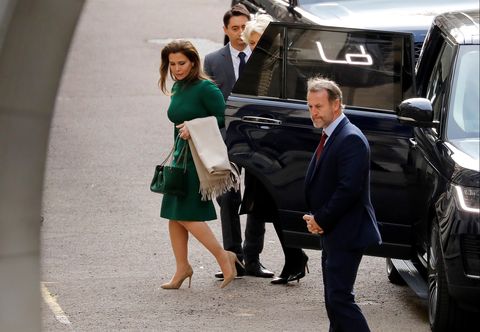

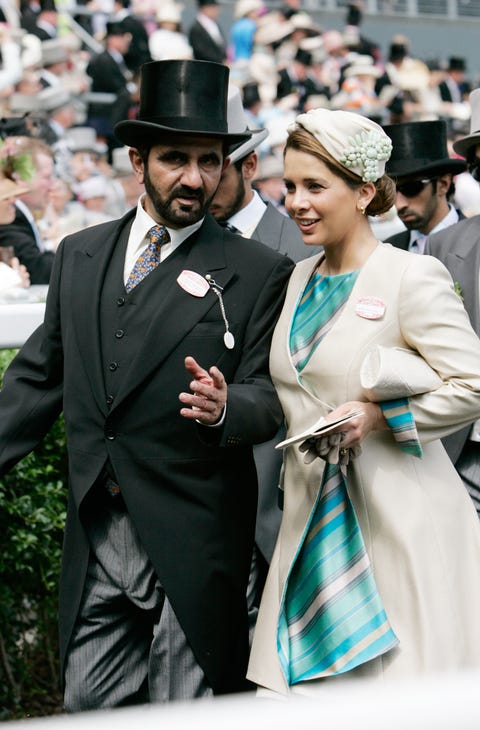



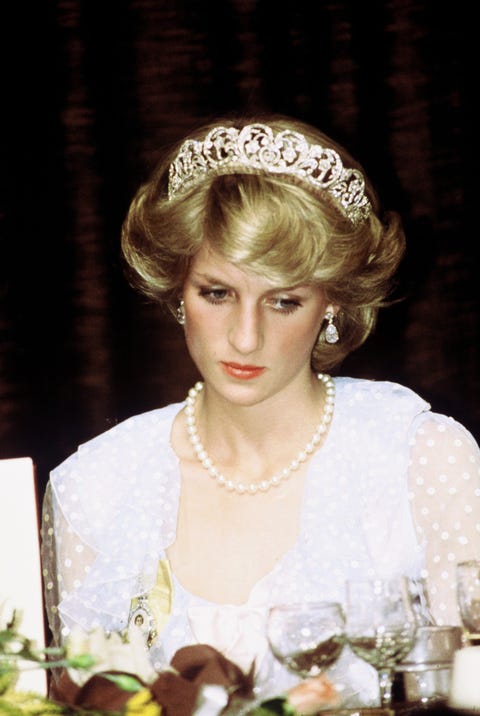

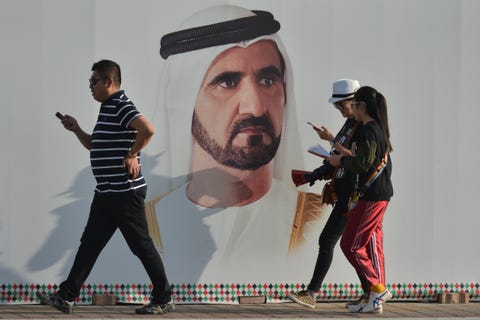
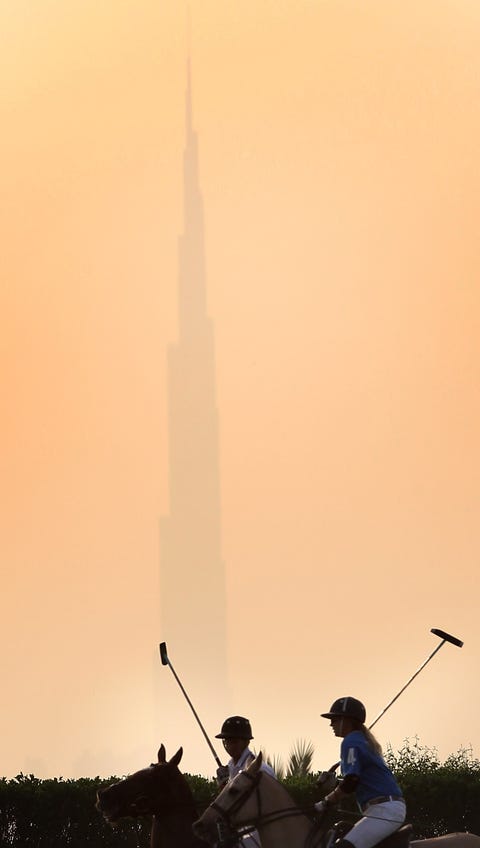


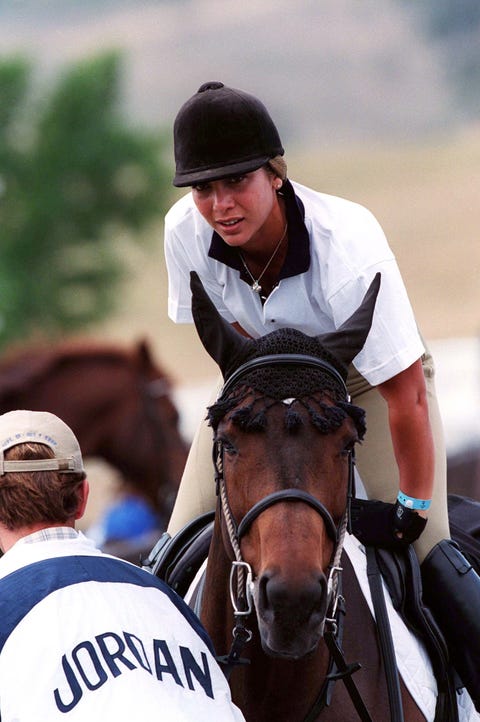





0 Response to "The Enraged King Again Petitions the King for a Divorce"
Post a Comment